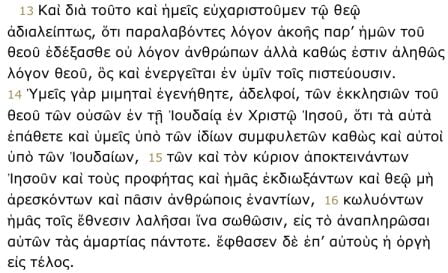10:28 AM Henry Neufeld has just posted two essays about the book of Hebrews and its instruction about the Old Testament (Hebrew Scriptures). Someday I would love to have a public dialogue with Henry on this subject. Any way, I have for many years been a big fan of Henry’s and I deeply respect him as a churchman, language scholar, and publisher. I think by reading his essays I better understand where he stands. He cares deeply about the Old Covenant (as I do) and is absolutely correct in saying that we Christians must never denigrate the Hebrew Scriptures in any way, shape, or form. So where do we disagree?
Well, I tend to see more discontinuity between the Testaments than Henry does. My theology, if you will, is more along Anabaptist lines than Reformed on this subject. The Reformers were unwilling to make a radical break with the past. Their churches remained established and the parish system was maintained. By contrast, the Anabaptists understood the example of early Christianity and the teachings of the New Testament to be the binding norm for Christians of all ages. For example, the Anabaptists argued that since infant baptism could not be found in the New Testament, it could not be used in a movement trying to emulate the life of the early church. To them the rite was non-apostolic and therefore an insidious shame to genuine Christianity. However – and this is a vital point – the real issue in baptism was not simply a return to the New Testament pattern. Rather, it involved a promise to walk in newness of life, that is, to live according to the Word of God by refusing to let sin reign in the mortal body. In other words, the local church, entry into which was through baptism, was to be a community of saints. The Anabaptists argued that without such concern for morality and genuine repentance, a slipshod practice of spiritual laxity would inevitably result. For the Anabaptists, only the New Testament contained the explicit teaching of Christ and His apostles. The Old Testament was not rejected, of course. It was simply subjected to the doctrines found in the Gospels and the Epistles. According to Pilgram Marpeck, the Old Testament must be distinguished from the New Testament as the foundation must be distinguished from the house. John Kiwiet summarizes Marpeck’s hermeneutics as follows (I give both the original German along with my own English translation):
Der alte Bund war eine Zeit des Suchens und des Dürstens und erst der Neue Bund eine Zeit des Findens und Stillens. Die Verheissung an die Alten geht im Neuen Bund in Erfülling [sic]. Die Finsternis wird zu Licht und der Tod zu Leben. Es ist wie der Unterschied zwischen gestern und heute; das Alte ist vorbeigegangen, und das Neue ist gekommon.
The Old Covenant was a time of seeking and thirsting and only the New Covenant a time of finding and stillness. The promise to the ancients finds its fulfillment in the New Covenant. Darkness turns to light and death to life. It is like the difference between yesterday and today; the old has gone away, and the new has arrived.
Marpeck’s point is that revelation was progressive and partial before Christ. He felt that the Reformers had mistaken the foundation of the house for the house itself. Marpeck’s two-covenant theology was based on Paul’s letter to the Galatians and the Epistle to the Hebrews, which taught that the highest court of appeal for all teaching concerning the church was the New Covenant. In short, he argued that the Scriptures must be interpreted Christologically.
Of course, I am not arguing that Henry fails to interpret the Bible Christologically. But I know some who do. This is one reason the Anabaptists looked with disfavor on professional pastors whose support came through tithes in the parish system. (Note: Henry has published a book by David Croteau that challenges the notion of tithing called Tithing After the Cross.) Unlike Old Testament Israel, their leaders were laymen, since Christ’s offering as High Priest was deemed to be exclusive. Their pastors, moreover, were chosen by the entire congregation according to the pattern established in the New Testament (Acts 14:23; 20:17, 28). They were supported by voluntary offerings (though many indeed supported themselves). As for the place of meeting, lavish sanctuaries were no longer necessary since Christ had abolished the Old Testament priesthood. John Darby, one of the founders of the Brethren church, encouraged the construction of simple chapels or assemblies with architecture that emphasized the priesthood of all believers. Pulpits and platforms were avoided. A typical chapel was a square room with a table and chairs for the speakers. Darby insisted on sitting among the members during the service and standing among them when he spoke rather than from behind the table. (Henry will recall that I requested to do the same when I spoke at his Methodist church in Pensacola several years ago.) The Anabaptists denied the significance of church buildings since physical structures were irrelevant to God. The buildings themselves were emblems of mere formalism. Large stone structures could never replace the true church of Christ that is comprised of two or three living stones gathered in His Spirit. They felt that with the addition of large numbers of extravagant temples the church had compromised with worldly standards of success. The Anabaptists energetically condemned this “externalization” of the Body of Christ.
Finally – and here is where I’m quite positive Henry and I would agree (based on the books he has published, many of whom are authored by “nobodies” in the world’s eyes, like my wife) – in Anabaptism appeal was made to the plain man’s judgment, unspoiled by the university. Those who toiled with their hands (craftsmen) or who worked in the soil (peasants) were presumed to be more receptive and teachable than those who had been corrupted by the folly of worldly wisdom. Here a certain irony arises, of course, for among the radical thinkers of Anabaptism there were not a few university trained men whose knowledge of the Scriptures and of the original languages of the Bible were unsurpassed. I think of my fellow Basler Conrad Grebel, who studied at the Grossmünster in Zürich for six years before becoming one of the 81 students to register at the University of Basel in the winter semester of 1514. At Basel he lived in the bursa (college) that was under the direction of the city’s leading humanist scholar, Heinrich Loriti (Glarean). From Basel he traveled to Vienna to continue his studies, and from there to Paris. Perhaps the Anabaptists’ attitude toward scholarship was based to a degree upon their work ethic. Hard work was considered a virtue. The peasant who worked with his own hands in cooperation with God’s nature was thought to have keener insight than the scribe with his multitude of books. So the Anabaptists might argue: “How can those who know the Master miss His simple and straightforward words in Matthew 23 condemning the use of honorific titles?” To the Anabaptists, use of such titles seemed the very culmination of worldliness and power. Their message was simple: Let the Reformers cling to the old ideas of Christendom. We will seek a thoroughgoing restitution of the church as it had been before the rise of Constantine.
Again, I’m not sure that Henry and I are very far apart on this subject. Indeed, we share very similar visions of the kingdom of God. Where we might differ is in our ecclesiology. The sixteenth century Anabaptists challenged the Catholic, Lutheran, and Reformed establishments of their day. (Sorry, Henry, but the Methodists weren’t around quite yet.) Centuries later Barth and Brunner would question the church-state system from within. Why, then, should it surprise us today when Christians engage in responsible criticism of their own denominations? The goal of the Anabaptists, as has often been said, was to cut the tree back to the root and thus free the church of the suffocating growth of ecclesiastical tradition. That this goal is being revived in our day should be the cause of great rejoicing.






















 Parts of it are truly outstanding. The translators render “Thou are my Son; today have I begotten thee” as “You are my Son; today I have become your Father.” Great so far. And then there’s this footnote on v. 8: “or, God is your kingdom.” The text of the Good News Bible, of course, reads “Your kingdom, O God, will last forever and forever!” The confusion here stems from the Greek: Is theos nominative or vocative? The translators have taken it as a vocative (correctly, in my view), but at least they note the alternative. Good for them. But here’s what puzzles me. Notice that they begin a new paragraph in verse 4.
Parts of it are truly outstanding. The translators render “Thou are my Son; today have I begotten thee” as “You are my Son; today I have become your Father.” Great so far. And then there’s this footnote on v. 8: “or, God is your kingdom.” The text of the Good News Bible, of course, reads “Your kingdom, O God, will last forever and forever!” The confusion here stems from the Greek: Is theos nominative or vocative? The translators have taken it as a vocative (correctly, in my view), but at least they note the alternative. Good for them. But here’s what puzzles me. Notice that they begin a new paragraph in verse 4. This is impossible. It contradicts the Greek text. Verses 1-4 are all one long sentence in the original. Making a new paragraph in verse 4 is just not empirically possible. It’s completely illogical — like asserting “married bachelor.” This sort of inconsistency drives me nuts. (People sometimes tell me I’m too OCD about these kinds of things but it’s part of my temperament.) I really, truly, sincerely believe we can do better. And yet, these kinds of oversights are hardly exceptional. Am I hereby trying to make a case for the study of Greek? In one sense yes. But at least you can compare other English translations before arriving at your conclusion as to the paragraph structure of a New Testament book. Again, I deeply appreciate the translators who produced the Good News Bible. When I was a teenager I literally could not put this book down. The text was readable, and the line drawings were fantastic. But our focus should always be on faithfulness to the text as the Holy Spirit inspired it — and this includes matters of syntax and structure, not just words.
This is impossible. It contradicts the Greek text. Verses 1-4 are all one long sentence in the original. Making a new paragraph in verse 4 is just not empirically possible. It’s completely illogical — like asserting “married bachelor.” This sort of inconsistency drives me nuts. (People sometimes tell me I’m too OCD about these kinds of things but it’s part of my temperament.) I really, truly, sincerely believe we can do better. And yet, these kinds of oversights are hardly exceptional. Am I hereby trying to make a case for the study of Greek? In one sense yes. But at least you can compare other English translations before arriving at your conclusion as to the paragraph structure of a New Testament book. Again, I deeply appreciate the translators who produced the Good News Bible. When I was a teenager I literally could not put this book down. The text was readable, and the line drawings were fantastic. But our focus should always be on faithfulness to the text as the Holy Spirit inspired it — and this includes matters of syntax and structure, not just words.